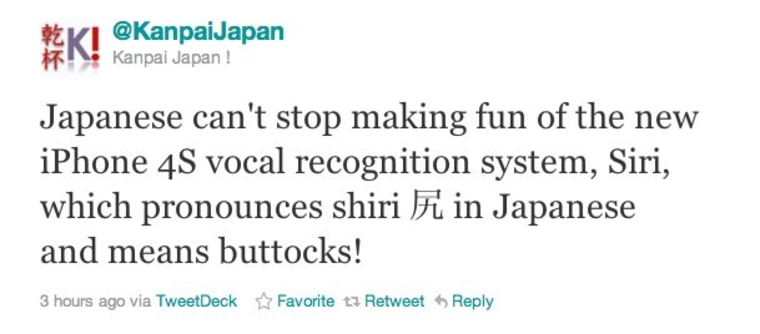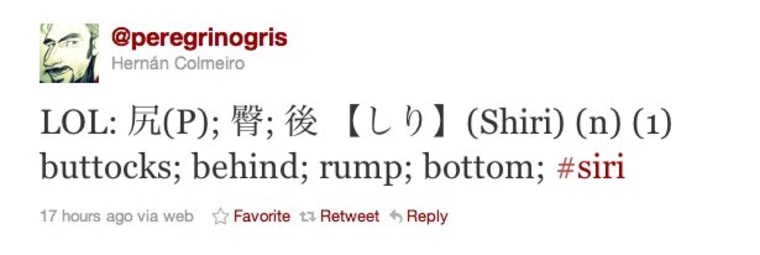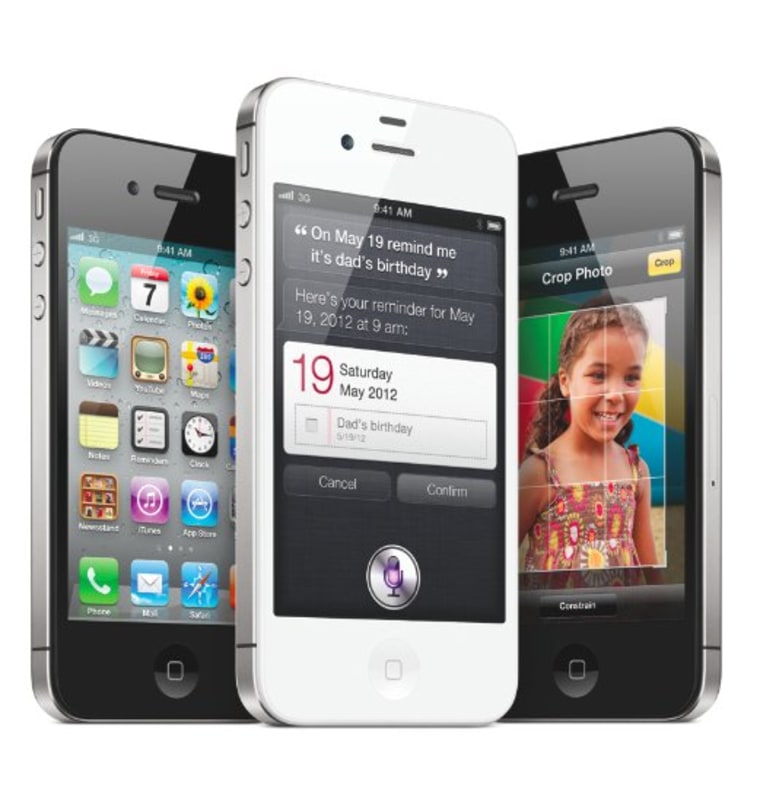While the world waited with bated breath on the release of a brand new iPhone 5, Apple's anti-climactic announcement yesterday of the iPhone 4S not only took the wind out of a lot of sails, it also made the company's naming choice for its new intelligent personal assistant look a little culturally ignorant.
You see, in Japan, where Siri isn't even going to be available when the iPhone 4S goes on sale there Oct.14, the word sounds a lot like "shiri" — which means buttocks.
As you can imagine, that brought on a lot of rump shaking jokes, all at Apple's expense.
The Wall Street Journal observed that "the kanji character 尻 soon cropped up below Siri as a trending topic on Twitter here. In the early hours after the announcement, one local Twitter wag user pointed out that when typing “Siri” into Google, the search engine asked 'Did you mean: 尻?'"
The Next Web has a screenshot of a Google search, with the kanji characters, asking if the searcher was looking for "bottom."
On Twitter, a search for "Siri buttocks" shows that a lot of people are finding amusement about the coincidence.


It's a word that makes toddlers giggle and grown people chuckle, so it's no wonder that if anything is giving Apple traction, it's that. But it's kind of sad that it's the joke that is getting all the attention and not the virtual personal assistant, which was one of the few highlights in Tuesday's presentation.
Here's a summary from the press release about the feature's potential:
iPhone 4S also introduces Siri, an intelligent assistant that helps you get things done just by asking. Siri understands context allowing you to speak naturally when you ask it questions, for example, if you ask “Will I need an umbrella this weekend?” it understands you are looking for a weather forecast. Siri is also smart about using the personal information you allow it to access, for example, if you tell Siri “Remind me to call Mom when I get home” it can find “Mom” in your address book, or ask Siri “What’s the traffic like around here?” and it can figure out where “here” is based on your current location. Siri helps you make calls, send text messages or email, schedule meetings and reminders, make notes, search the Internet, find local businesses, get directions and more. You can also get answers, find facts and even perform complex calculations just by asking.
We're not quite at the Skynet stage yet, but this is definitely one step closer on a mass scale.
Apple has had some experience with poor naming choices. Remember the hubbub with the iPad when it first came out?
It's worked out now, but the initial derision and association with feminine hygiene products stuck for a little bit. Maybe after the initial round of jokes, this will flame out, too. But hopefully, if the assistant ever gets to iPhones in Japan, Apple will reconsider naming it something else so the Japanese won't be calling their phone "butt" all the time.
Of course, plenty of Westerners find Japanese names of products equally amusing, given their English translation. We've seen "Cock Soup," "Cream Collon," and "Baby Maker" DVDs. There's even a whole site dedicated to the mangling of the English language in Japanese: Engrish.com.
But all kidding aside, Apple would be doing itself a favor if it did change the name to something more suitable; after all, the iPhone is the best selling phone in Japan, commanding 72 percent of the country's smartphone market by March 2010.
More stories:
- Meet Siri, your personal iPhone assistant
- Live coverage: Apple unveils the iPhone 4S
- Apple's iOS 5 available on Oct. 12, brings 200 new features
Check out Technolog on Facebook, and on Twitter, follow Athima Chansanchai, who is also trying to keep her head above water in the Google+ stream.
